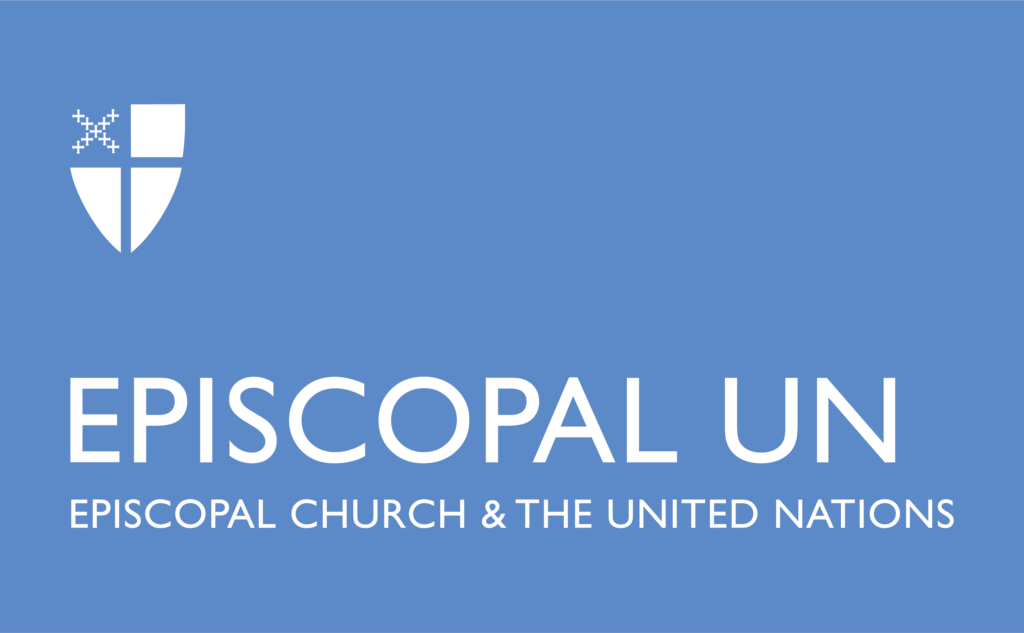The information below is based in part on research by The Archives of The Episcopal Church and highlights selected UN-related activities of The Episcopal Church and individual Episcopalians, paired with archival documents illustrating the events.
For more information or to add to this historical timeline, contact Lynnaia Main.
Support for the United Nations since the beginning
According to Archives, “The Episcopal Church has strongly supported the United Nations since before its inception, advocating for its creation in the 1940s, promoting its human rights, environmental, disarmament and peace-keeping initiatives from 1948 forward.”
The Episcopal Church and the Founding of the United Nations
From at least 1942 forward, Episcopalians welcomed the creation of the wartime United Nations body and subsequently advocated strongly for the formation of a permanent, international body to improve worldwide collaboration and stability.
Individual Episcopalians and the United Nations
Individual Episcopalians have been involved with the United Nations since before its inception, and a number of them have filled substantial roles. Among the earliest individuals was Bishop William Scarlett of the Diocese of Missouri, a longtime proponent of Church engagement with social causes who chaired the General Convention’s Joint Commission on Social Reconstruction. Bishop Scarlett served on and later chaired the Federal Council of Churches Commission on a Just and Durable Peace, which was one of the first organizations to call for the creation of a United Nations organization. This experience undoubtedly informed his leadership of the JCSR.
In the course of the Joint Commission’s work, Bishop Scarlett worked with Eleanor Roosevelt, an Episcopal church member and First Lady of the United States, who later chaired the UN Commission on Human Rights. When in 1946 the JCSR prepared a book relating Christian principles to key social situations of the time (including the United Nations) Mrs. Roosevelt contributed a chapter on minority issues [9]. Christianity Takes a Stand: An Approach to the Issues of Today was prepared by the JCSR during its second triennium of work and published in 1946.
Ongoing General Convention support
In the decades since the establishment of the United Nations, nearly every session of the Church’s General Convention has included resolutions relating to the United Nations. In many cases, the resolutions support new or ongoing UN initiatives or actions, such as those relating to human rights, disarmament, care of the environment, efforts to end hunger and discrimination, and peacekeeping. Others either highlight to the United Nations special concerns of the church or urge the United States to take certain actions relating to the UN, such as ratifying UN conventions. In subsequent years, the General Convention advocated on behalf of other UN conventions relating to human rights, such as those on genocide, slavery, forced labor, and the political rights of women and regularly urged ratification by the United States.
Episcopalian Representatives (Ambassadors) to the United Nations
A significant number of U.S. Ambassadors to the United Nations have been Episcopal lay people and clergy. This list, which may well be incomplete, includes the first Ambassador, Edward Reilly Stettinius, Jr. (1946), Henry Cabot Lodge, Jr. (1953-1960), George Herbert Walker Bush (1971-1973), Madeleine Korbel Albright (1993-1997), and the Rev. John Claggett Danforth (2004-2005).
For more information about how to engage with the United Nations and The Episcopal Church’s ministry with the United Nations, visit The Episcopal Church and the United Nations webpage. You can also follow Episcopal UN social media on Facebook, Twitter and via the hashtag #EpiscopalUN. Also visit the United Nations webpage for more information on its range of activities.
[1] The Living Church, February 11, 1942, pp. 14-15.
[2] Journal of the General Convention, 1943, Appendix XXIII, pp. 464-470.
[3] Newsweek, October 18, 1943, p. 104.
[4] A Better World for All Peoples, National Council, The Episcopal Church, 1944.
[5] William Scarlett Papers, Commission on Social reconstruction press release, January 8, 1945.
[6] Journal of the General Convention, 1946, Official Acts of the Presiding Bishop, p. 24.
[7] Journal of the General Convention, 1946, Official Acts of the Presiding Bishop, p. 30.
[8] Journal of the General Convention, 1949, pp. 352-353.
[9] Journal of the General Convention, 1946, JCSR report, Appendix 37, pp. 584-585.


